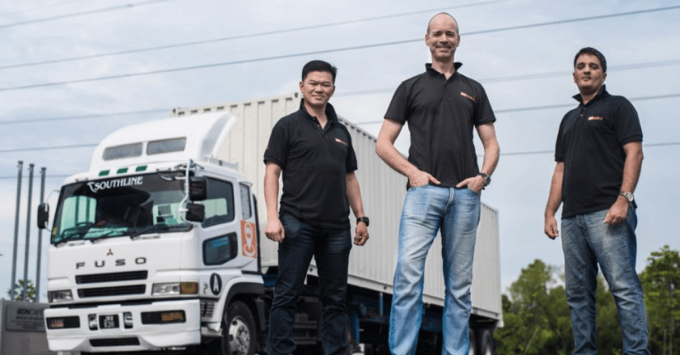Conf call redux: does Kuehne + Nagel know its toys from its teus?
Yo bro, where’s the growth?

Malaysia-based Ezyhaul has raised US$16m in a Series B fundraising round, one of the largest in a string of recent investments for digital trucking start-ups in South-east Asia.
Founded in 2016, Ezyhaul was one of the region’s first “Uber-like”, on-demand trucking apps to focus on first- rather than last-mile load matching, for both domestic and cross-border road freight.
“The key problem we’re solving is empty capacity on the roads and empty backhauls,” Raymond Gillon (pictured above, middle), Ezyhaul’s chief executive and co-founder, told a previous interview with The Loadstar.
According to Ezyhaul, the funding follows $5m raised last year, and is earmarked to support expansion into Indonesia and the Philippines.
It already has operations in Malaysia, Singapore, Thailand and India, growing by 900% over the past 12 months, said the company, and handling 50 million kg of freight in 2018. Customers include Coca-Cola, Reliance Industries, Flipkart, DHL and DB Schenker.
As with other logistics segments, such as freight forwarding, investors appear to be keen on funding road freight disruptors elsewhere in South-east Asia, too.
So far in 2019, Indonesia-based firms Kargo and Ritase have raised $7.6m and $8.5m respectively; Malaysia’s TheLorry raised $5.8m; and Vietnamese player Logivan bagged $5.5m.
“We’re really happy to see that other companies are coming up, copying the model and getting funded,” Mr Gillon told The Loadstar last week.
“I think it validates the model and shows there is a shift happening in the market. Since the market in South-east Asia is very large, we are not experiencing too much direct competition from other platforms yet, as the different players seem to be able to carve out their own market share, but this situation will likely change over the next few years.
“Therefore, for our strategy, it’s really important to build a leading position in each of the key South Asia markets, by ensuring we are an early entrant and keep developing our tech to remain relevant,” he added.
Ezyhaul’s core service is domestic trucking. Mr Gillon noted there had been a dip in the Malaysian market, “after last year’s election and the resulting economic slump”.
By contrast, he said, Thailand was experiencing low single-digit growth, while growth is “definitely larger” in Indonesia and Vietnam.
He said the firm’s cross-border solution, which stretches from China to Singapore, represents 15-20% of the business.
“Cross-border is showing significant growth, even though the overall output from China has been under pressure since last year due to the trade war,” he noted. “We are seeing a relocation of production activities from China to other countries like Vietnam.
“Nonetheless, I am convinced that with the improving road infrastructure in South-east Asia, cross-border road freight will remain a growing market segment and become a real alternative to other modes like ocean freight, with only slightly higher costs but much shorter lead times.”
In a related development, Kuehne + Nagel this week gas announced the launch of etrucKNow in Thailand, an “AI-enabled” freight platform for overland shipments in Asia Pacific.
The 3PL said the platform would give shippers access to a “simplified quotation and comparison process,” while carriers can “convert their empty space or trips into potential revenue”.
K+N plans to roll-out etrucKNow to India, Vietnam, Singapore, Malaysia, New Zealand and Australia by 2020.
Comment on this article